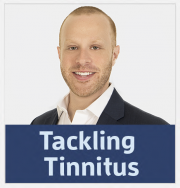|
www.HealthyHearing.com |
Doctor not taking your tinnitus seriously? Don't lose hope
Contributed by Glenn Schweitzer Key points:
When a person experiences problematic tinnitus for the very first time, they don’t know it yet, but they are likely about to embark on a tough medical journey. For reasons that are not immediately clear, patients with ringing in their ears often face challenging and unnecessary obstacles as they attempt to seek treatment. From doctors that tell you there is nothing they can do to help you, to the fact that 99% of tinnitus-related information available online is terrifying, fear and suffering are amplified at every turn. 
At its worst, seeking medical attention for tinnitus can be a devastating and traumatic experience that exacerbates every aspect of the problem. The good news? Despite what your doctor tells you, there are many treatments for tinnitus depending on the cause, and lasting relief is always possible through a mental process known as habituation. So if treatment is possible, the question remains: Why is it still so difficult for tinnitus patients to get help? If you are suffering from tinnitus, it’s an important question to ask. Because if you can understand the obstacles in front of you, and how they got that way, you can avoid making the problem worse and start getting better! The problem: 'There's nothing we can do'When confronting severe tinnitus, the most insidious problem a patient may face is the one that shouldn’t exist at all: Doctors who say something along the lines of, “I’m sorry, there’s nothing I can do about your tinnitus – you’re just going to have to learn to live with it.” If these words sound familiar, you are not alone. Every tinnitus patient I know, and I’ve worked with more than 700 tinnitus sufferers one-on-one as a tinnitus coach, has been told this (or something like this) by at least one doctor or medical professional. I’ve heard it myself about my own tinnitus. Doctors are not being intentionally malicious when they say this, but their good intentions ultimately don’t matter in these situations. In my opinion, it’s the absolute worst thing you could ever say to a tinnitus sufferer, yet nearly every patient hears it at some point. And hearing it almost always makes the problem of tinnitus worse. So why do so many doctors say this to their patients? How did it get this way? Another problem: Traditional treatment options are limitedIt starts with the fact that the modern Western medical system is largely built around the treatment of injury and disease with medication and surgery. When there are pharmaceutical interventions available, medical treatment is simply a matter of diagnosing the patient and dispensing the proper medication. The obvious problem is that there are not medications or corrective surgeries available for every condition, and many patients with chronic and incurable conditions fall through the cracks in the system. This is true for tinnitus patients—with a few exception, there are currently no medications available to cure or treat tinnitus directly. Most tinnitus treatments generally require a multidisciplinary, multi-pronged treatment approach and self-care. As a result, in the absence of a pill they can easily prescribe (or knowledge of any other non-medication-based treatments), many doctors wrongly conclude that there is nothing they can do to help tinnitus patients. Also, there's a lack of tinnitus specialists
when medical providers aren't up-to-date on the best treatment options. Most doctors see dozens of patients every day for 10-15 minutes at a time and then go home to their families at night. They have lives outside of work, and most of them are not spending every minute of their free time staying up to date on the latest research and published journal articles on every condition they encounter in their practice. Many doctors simply never become aware of any actual treatments available for tinnitus sufferers. Another issue is that doctors often feel uncomfortable addressing the psychological and emotional impacts of a problem like tinnitus. But even when they are both willing and qualified to provide counseling, as is the case with many audiologists, they are unable to get reimbursed from insurance providers for this kind of service, and so they avoid it entirely. All of these factors combine to produce a big problem for tinnitus sufferers: Very few general practitioners, ENTs, and audiologists are equipped with the knowledge and tools to treat tinnitus patients effectively. Of course, there are many exceptions – exceptional doctors and hearing specialists who are very knowledgeable about tinnitus can be found, and qualified tinnitus-specialist doctors who have fully devoted their practice to treating tinnitus patients do exist, but they are far and few between. The 'nocebo' effect and tinnitusUnfortunately, the problem of your doctor not being able to provide adequate treatment doesn’t end when you leave their office. Most people have heard of the placebo effect – the phenomenon where if you believe you are receiving an effective medical treatment, it will produce a positive therapeutic result, even if you are not actually receiving an active medication. Simply believing you are receiving a treatment somehow activates the body’s innate healing capabilities. What most people don’t know, however, is that the placebo effect has an evil opposite: a phenomenon called the nocebo effect. It’s just as powerful, but it produces negative effects and outcomes instead. If you are told by someone with authority–like a doctor–that something is going to harm you, and you believe it, you are likely to be harmed. Or to put it another way, if you are told there is nothing that can be done to treat your condition, and you believe it, you will likely resign to hopelessness and despair. Medical hexing and feeling powerlessMedical hexing is a phenomenon where doctors unwittingly put the nocebo effect into action and end up negatively affecting a patient’s health outcomes. For better or worse, the way that a medical professional talks to a patient about their condition can have a significant impact on that patient’s health outcomes. Words matter, and yet this is often overlooked. In the case of tinnitus patients, a doctor telling you that there is nothing they can do to help you is bad enough, especially considering treatments do exist. But many doctors also say, “You just have to live with it,” which can be interpreted as “There is nothing you can do to help yourself.” And that is even worse. When I first started working with tinnitus patients, I used to think that the vicious cycle of suffering always started with fear. But I’ve come to realize that I was wrong. Fear is certainly part of it, but the fear doesn’t arise out of nowhere. The emotion at the core of every problematic case of tinnitus is powerlessness. Every single emotional and psychological impact of tinnitus can be traced back to feeling powerless, and little else that will make you feel more powerless than a doctor telling you there is nothing you can do. If a doctor tells you that you are powerless to help yourself, this can become your reality. Many sufferers just stop trying to help themselves. And it’s still only the first obstacle that a tinnitus sufferer will likely face. Dr. Google and problem of researching symptoms
to hearing loss. At this point in a tinnitus patient’s journey, confronted with no clear treatment options or even a basic understanding of the problem, fear and anxiety can start to spiral out of control. Suffering intensifies as a result. For most people, if they haven’t given up yet, the next logical step in the journey is to do research themselves. They think, “Someone somewhere must know something that can help me.” So they turn to Google and start searching for answers and hope. But instead of hope, they find confusion and despair at every turn. Half of what they find conflicts with everything else they find, most of it is terrifying, and it all serves to reinforce the feelings of powerlessness. Many people then look to online tinnitus support group forums and Facebook groups for answers, only to discover case after case of even greater suffering. The unfortunate reality is that many people who overcome difficult health problems like tinnitus are not the ones writing about it in these groups. They just get on with their lives.
The positive, hopeful and helpful voices can be drowned out by those who are still suffering. As a result, forums and Facebook groups can quickly become echo chambers of fear and frustration. The other group members are on the same difficult journey, confronting the same challenging obstacles. Instead of hope, many sufferers often just find more powerlessness, and sink into further despair. Are you feeling trapped?At some point along this journey, these feelings of powerlessness and fear become deeply rooted beliefs about the existential nature of your situation. After all, your doctor told you there was nothing you could do, and your research seems to have confirmed the assessment. When facing these kinds of obstacles, it can begin to feel insurmountable. It’s not hard to see how a tinnitus sufferer could lose all hope entirely. But there is hope–real hope–for lasting relief. Even when medical treatment isn’t possible, you can completely restore your quality of life through a mental process called habituation. And there are many ways to facilitate this process. But if no one ever tells you this, how would you know? And how do you reconcile this idea of hope when you’ve believed your situation to be hopeless for so long? When shown the possibility of recovery, you may not be able to grasp what you’re seeing. It’s easy to end up feeling like you are trapped by your tinnitus. You may be begin to feel helpless and hopeless and find yourself dwelling on negative thoughts. Research shows that cognitive-behavioral therapy can help ease the emotional impact of tinnitus including negative thinking. If your tinnitus is triggering suicidal thoughts, please see our article on suicide and tinnitus. We've tried to provide immediate actionable steps you can take now to feel better. Self-advocacy and the importance of having hopeWhen you consider all the pieces of this puzzle, it feels like a miracle that any tinnitus patients ever find help. And the tragedy of it all is that it doesn’t need to be this way. If doctors simply changed their messaging around tinnitus, vast quantities of suffering could be eliminated overnight. Yet despite every obstacle a tinnitus sufferer may face, relief is still possible and always has been. There was always hope, even if you didn’t know it until now. Until things change, as tinnitus patients we must be our own best advocates and develop coping strategies. If you have hearing loss and tinnitus and have been in denial about it, address it. That is often an important first step. We also have to seek out doctors who give us hope and show patience and kindness. And that might mean getting second, third, or even fourth or fifth opinions. Read up on the treatments for tinnitus that have been proven to help, from trustworthy sources. We must avoid sources of information that fill us with dread. When one treatment option doesn’t work, we must try others. We must never give up. We must find others who have succeeded and learn from their success. And we must always remember, no matter how difficult things may seem, that there is hope. Glenn Schweitzer
|
Featured clinics near me
Earzlink Hearing Care - Reynoldsburg
7668 Slate Ridge Blvd
Reynoldsburg, OH 43068

Find a clinic
We have more hearing clinic reviews than any other site!


 Glenn Schweitzer is an entrepreneur, blogger, and the author of Rewiring Tinnitus and Mind over Meniere’s. He is passionate about helping others who suffer from tinnitus and vestibular disorders and volunteers as an Ambassador Board Member for the Vestibular Disorders Association (VEDA). Through his blogs, he continues to raise awareness for tinnitus, Meniere’s disease, and other vestibular disorders, spreading his message of hope to those in need.
Glenn Schweitzer is an entrepreneur, blogger, and the author of Rewiring Tinnitus and Mind over Meniere’s. He is passionate about helping others who suffer from tinnitus and vestibular disorders and volunteers as an Ambassador Board Member for the Vestibular Disorders Association (VEDA). Through his blogs, he continues to raise awareness for tinnitus, Meniere’s disease, and other vestibular disorders, spreading his message of hope to those in need.